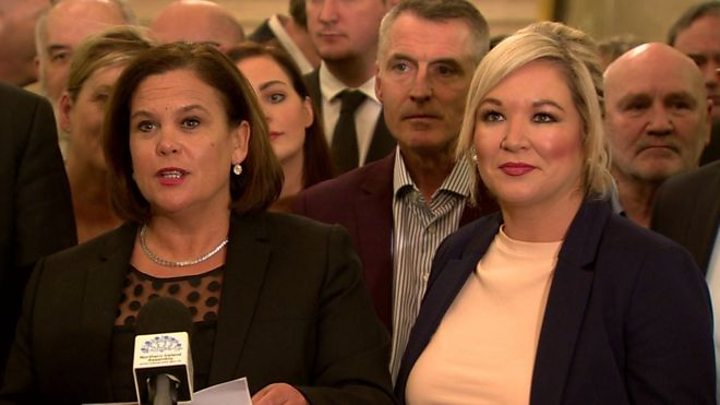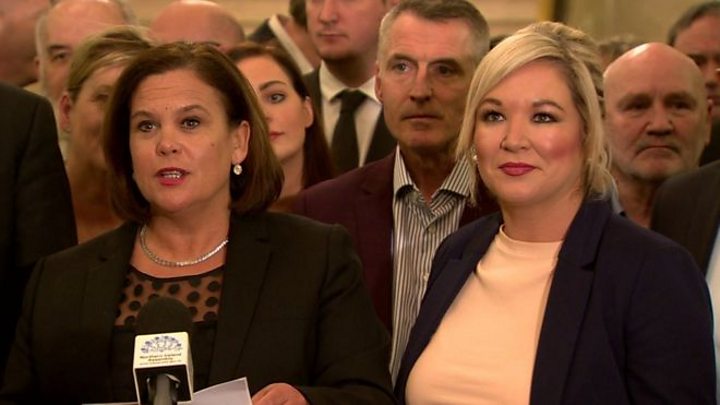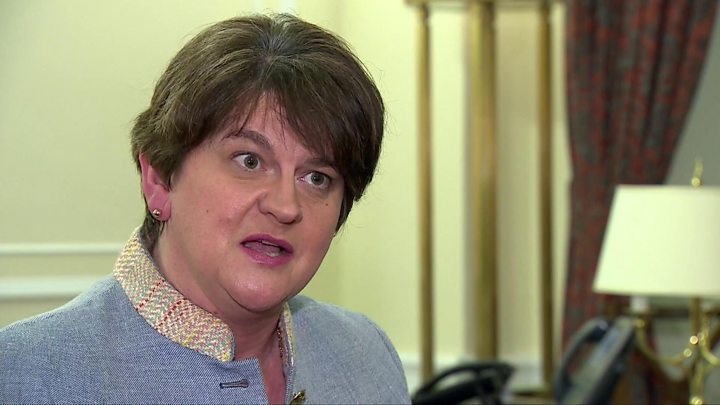Stormont: Parties return to assembly after striking deal
Sinn Féin and the DUP back a deal to restart the devolved government after three years of deadlock. …


Media playback is unsupported on your device
Sinn Féin and the DUP will re-enter devolved government in Northern Ireland after three years of deadlock on Saturday.
The two parties have supported a deal to restore Stormont’s political institutions.
The British and Irish governments published the draft proposals on Thursday, after nine months of talks.
Stormont’s power-sharing coalition, led by the DUP and Sinn Féin, collapsed in January 2017 over a green energy row.
Prime Minister Boris Johnson welcomed the agreement, tweeting it was a “great step forwards for the people of Northern Ireland”.
Sinn Féin and the DUP are expected to elect a speaker of the assembly and appoint executive ministers in the afternoon.
The proceedings will be streamed live on the BBC News NI website from 13:00 GMT, there will also be coverage on BBC Two NI from 15:30 GMT.
Analysis by BBC News NI’s political reporter Jayne McCormack
What will happen later?
This will be an exceptionally rare Saturday sitting of the assembly.
We know, thanks to an order paper released by the assembly, how the day is set to go.
Once the MLAs enter the chamber, they first have to elect a new Speaker.
Then the DUP and Sinn Féin, as the biggest unionist and nationalist parties, will nominate a first minister and a deputy first minister who will lead the executive.
The parties will then select a new justice minister, through a cross-community vote, meaning it requires a majority of unionists and nationalists.
The job has only ever been held by the cross-community Alliance Party, and most recently independent unionist MLA Claire Sugden, but it is not clear yet who will take it.
After that, the remaining executive posts will be filled, with the parties’ respective sizes dictating how many portfolios they are allocated, according to the D’Hondt system.
The proceedings are estimated to finish at about 16:30 GMT, but given a new era is beginning at Stormont, the day could run on a good bit longer.
What caused Stormont to collapse?
Relations between the DUP and Sinn Féin had deteriorated in recent years as the two parties were diametrically opposed not only on Northern Ireland’s position within the UK, but also issues such as the Irish language; same-sex marriage; abortion and how to deal with the legacy of the Troubles.
But unexpectedly it was a row over a green energy scheme which pushed their relationship past breaking point.
The Renewable Heat Incentive (RHI) scheme was set up by DUP leader Arlene Foster when she was enterprise minister, but it ran over budget and at one point threatened to cost taxpayers £490m.
Sinn Féin demanded that Mrs Foster step aside as first minister during an inquiry into the RHI scheme and when she refused, they pulled out of government on 9 January 2017.
How was a deal struck?
Two key sticking points in the Stormont talks were around an Irish language act and the petition of concern.
The draft deal says there is to be “meaningful reform” of the petition, which would be “reduced and returned to its intended purpose” and would “only be used in the most exceptional circumstances and as a last resort, having used every other mechanism”.
The proposed deal would see legislation created for the appointment of both an Irish language commissioner and an Ulster-Scots commissioner.
Earlier, Irish language group Conradh na Gaeilge welcomed the draft deal as “historic advancement but added it “falls very much short” of promises for an Irish Language act.
Other key points in the deal include the Northern Ireland Executive settling an ongoing pay dispute with nurses and increasing policing numbers.
What did the parties say about the deal?
Sinn Féin President Mary Lou McDonald told a Stormont press conference on Friday that her party will nominate ministers to an executive.
She said Sinn Féin was up for a return to “genuine power sharing”.
DUP leader Arlene Foster described the proposals as a “fair and balanced deal”.
“I know there will be challenges in the deal, not least we need to make sure we have the finances to be able to deal with all of the issues in Northern Ireland that are present at the moment, particularly in and around the health sector.”

Media playback is unsupported on your device
The Social Democratic and Labour Party (SDLP) leader Colum Eastwood confirmed on Friday that his party will return to Stormont when the assembly is recalled.
The Alliance Party also confirmed on Friday night it would support the deal. The Ulster Unionist Party are meeting on Saturday morning to decide.
How has the DUP and Sinn Féin’s decision been received?
Tánaiste (Irish Deputy Prime Minister) Simon Coveney, who helped broker the deal, said: “History is being made today.”
He added: “We now have confirmation from the two largest parties in Northern Ireland that they both are committed to re-entering an executive and establishing a functioning Stormont assembly again.
The leaders of Ireland’s main churches welcomed the agreement, saying it offered “new hope” and a “new start” for Northern Ireland’s political institutions.
In a joint statement, the leaders of the Church of Ireland, Methodist Church in Ireland, Roman Catholic Church, Presbyterian Church in Ireland and the Irish Council of Churches said the government’s proposals “offer an opportunity to build a peaceful and just society”.
However, the Orange Order earlier said it has “very serious concerns” about the deal and could not support the proposal to appoint an Irish language commissioner.




